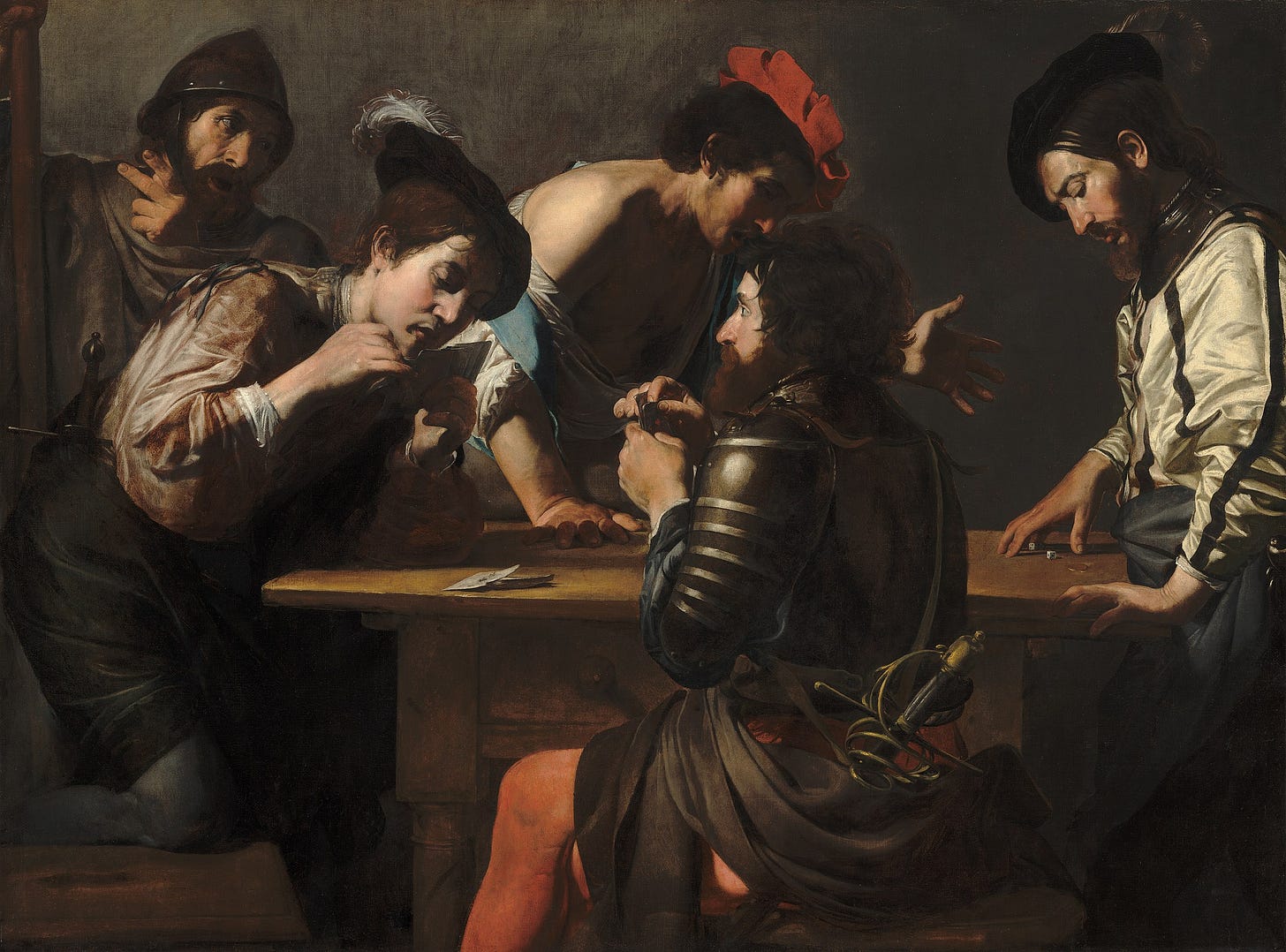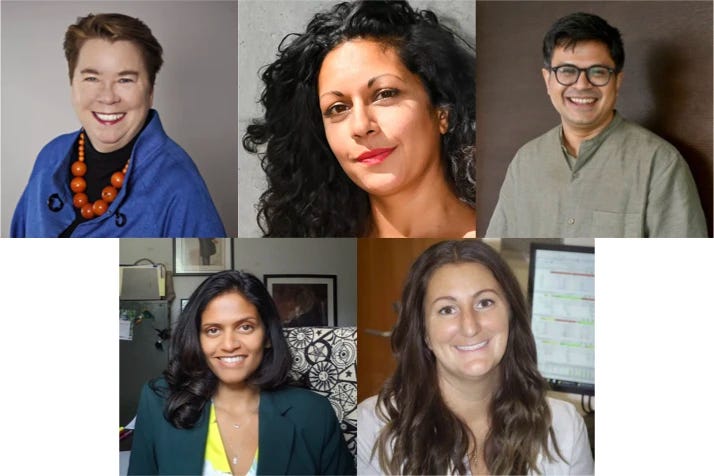Rolling the DEI
There’s no doubt that bias is everywhere in academia; and it is very far from being unconscious. But can men expect to win accolades in academic life? Probably not.
I have always been fascinated with dice and probabilities, ever since I began enjoying role-playing games in my early teens. In particular, the repertoire of peculiarly shaped polyhedral dice was so magical in its allure, so esoteric and intoxicating that many a proponent would save up their pocket money to buy impressive sets that gleamed like gemstones on the gaming table. And since the very survival of one’s beloved player character from one game to the next frequently depended on the outcome of a dice roll, to most of us the mathematical mechanics behind probabilities and likelihoods became ineluctable. To contradict Einstein, in the multifarious fantasy worlds of Dungeons & Dragons the gods definitely play dice. Sorry, Albert.

In a recent newsletter emailed to absolutely everyone on my campus, the UTM Express, a local propaganda bulletin for any and all of the university’s employees who prefer to outsource their thinking on political matters—aside from the obligatory opening salvo that lauds the University of Toronto as a high ranking international contender among universities of the world, and then proffers a white-hot link entitled “Advancing an environment built on respect, diversity and inclusion”—the topics of the day quickly settle into more parochial territory, such as the disruptions prompted by the Canada Post labour dispute, the campus procedural for class cancellations on snow days, and the latest winners of research awards.
This last item makes me pause to glance over the fêted faculty members deserving of honourable mentions. There are five prize-winners listed; and only one is a man. My hackles instantly rise, but I suppress the sudden desire to slam my fist down on the table and upset the coffee cups. The lucky male I notice is an Asian man. Of course, he might identify otherwise, but I am going to do what others shy away from in 2024 and choose to rely on the visual evidence.

Strangely, I have not yet reached that end-stage delusion—unlike so many of my more respectable peers—where otherwise intelligent and well-educated individuals vigorously deny the reality of their own senses in their efforts to supplicate before the altar of social justice advocacy. After all, these days, you are either with them or you’re against them. The penalty for dissension is castigation and ostracisation. Very fortunately, unlike the captive cavaliers of the English Civil War, I don’t really mind at all being sent to Coventry. I’m from there.
But I digress. Unsurprisingly, while contemplating this almost complete victory and celebration of feminine dominance, I am drawn like a rare earth magnet to the mantra of diversity, equity and inclusion (DEI), whose goal I have learned—and have been strenuously reminded of countless times—is to achieve equality of outcome in any situation within a hierarchy where power and privilege are bestowed. This includes today’s universities’ obsession with the neo-Marxist, counter-meritocratic and quota-driven determination of all job appointments, for instance; and the granting of academic recognition; and, naturally, the awarding of prizes like those announced in the UTM Express.
So, let’s look a little closer. We can apply mathematical methods. According to the most recently published data made available by the University’s DEI dashboard, we are told that in 2023 a full 60% of employees on the UTM campus identify as female. We are also told that fractionally over 50% of all employees identify as white.
Let us assume—and I don’t regard this as unreasonable—that these two identifiers are independent of one another, and reflect the distribution of those traits across all of the survey’s subgroups, such as Faculty members, since only these people are the ones eligible to win research accolades. Moreover, we should assume that merit and talent are not linked in any way to gender or race, since no one in their right mind would want to admit to such flagrant misogyny or racism, surely? To do so is to slip into the debate on eugenics.
In that case, you can deduce that one in five people up for any given award are white males. The chance that there would be no white men at all among the five prize recipients, then, is simply the residual of one and the fifth power of 80%, which comes out to be about 33%. This is half as likely as the situation where we find at least one white male among the winners, or betting odds of 2-to-1 against.

Similarly, if we narrow our view to look solely at gender, then an elementary exercise in calculating probabilities reveals that the aggregate likelihood of there being just one man, or no men at all among the winners is fractionally over 33%. Once again, all else being equal, it is twice as likely than not (i.e., 66%) that there would be more than one male-identifying individual among the winners. What gives?
It doesn’t stop there. A fortnight earlier, the same newsletter proudly declared the winners of the campus’s staff awards. Here they are. Take a moment. What do you notice?

Well, the number of prize recipients is different. There are six winners here, of course, and not five. But that probably wasn’t your first thought. To be clear, the individual on the far right—positionally, not politically—is our esteemed principal, Professor Alex Gillespie. She doesn’t count as one of the winners; and should your thoughts have strayed unbidden into the territory of a Fey Weldon novel, you’re not alone. Or Roald Dahl.

Mathematically, the odds of this second Oscar lineup happening at random such that there are fewer than two men present is now 3-to-1 against. No doubt, we can anticipate some fine acting going on in front of the camera.
Much like coin tosses, we would like to think of these events as independent from each other. I could toss up my favourite fifty-pence piece, for example, and quite plausibly score five heads in a row. Nevertheless, as every schoolchild knows, the prospect of revealing another head on the next coin-toss is, counterintuitively, still even chances. But these campus award-givings are intertwined events, and the underlying decision processes are governed by the same remorseless orthodoxy of thought—one that is, in my view, demonstrably misandrist and racist.
If we assume some sort of connection between these selection processes and go ahead and stack all eleven of these awards—all of them announced in the same calendar month—then the probability of that there aren’t more men in the line-up has now dropped to 1 in 5.
The chances there are no white men at all, you ask? Ten-to-one against.
This is starting to look improbable.
The take-home message appears to be that there is not much chance for a male to be recognised, let alone a white male; and this all draws into question the validity of the meritocracy these academic mandarins purport to champion, as well as the unmistakable whiff of hypocrisy that accompanies their pursuit of DEI.
All of this will no doubt come across as the cantankerous musings of an academic has-been, and I’m not about to challenge that assessment because it is simply far too exhausting. After all, that is the kind of lazy perspective that provides for the very distinctive breed of binary and unnuanced echo-chamber reinforcement that many academics have downloaded as a part of their scheduled morality updates in recent years.
I am simply an observer. I question what is going on. Looking at the bigger picture, these are just some of the mundane consequences of the vast social justice juggernaut that has passed through the universities, crushing so many hapless, honest people in its path. But the mighty ideological machine is too clumsy and ungovernable to be steered away from the precipice that awaits it; and the cliff-edge is fast approaching.





'I don’t really mind at all being sent to Coventry. I’m from there.' You kill me. As for your observations, they are right on.
Regarding '(DEI), whose goal I have learned—and have been strenuously reminded of countless times—is to achieve equality of outcome in any situation within a hierarchy where power and privilege are bestowed.' I entirely believe you that there are people really talk like this, I am fortunate to avoid such idiots in my my daily life. Your academia appears to be rife with them.
Despite the award winners described herein, as to why there are relatively few women in engineering, hard science and technology, its pretty clear to anyone who lives in the real world that on the aggregate, women/girls are just not that interested. There are easy empirical examples to prove this, one example with which I have become familiar is amateur coding C++ and mechatronics (Arduino and Raspberry Pi). Despite the DEI style photos in Arduino marketing material, its patently obvious from traffic on their technical fora that people who are into this in their spare time and keeners are 95% male, minimum. And this kind of example is perfectly unbiased, its a subject which has basically zero barriers to entry, is easy access and low cost, literally anyone can start learning Arduino and mechatronics. You simple have to WANT to and put in the effort, and find it. And the people who do this are overwhelmingly male.